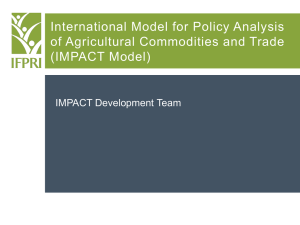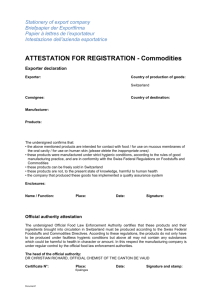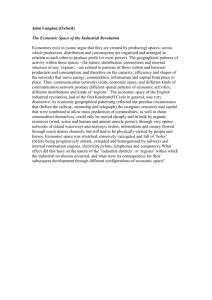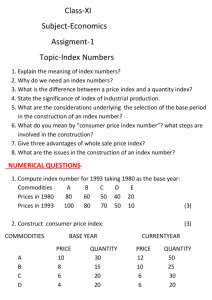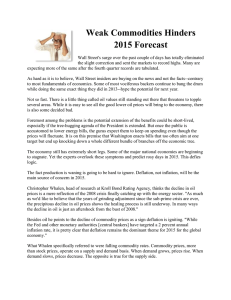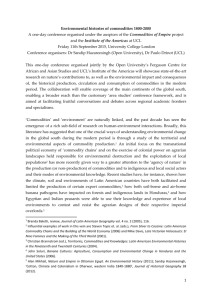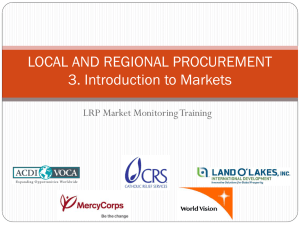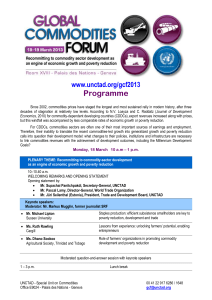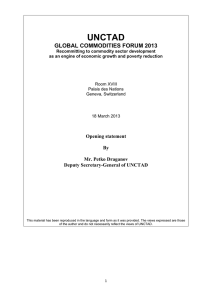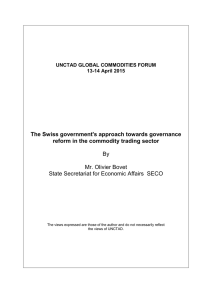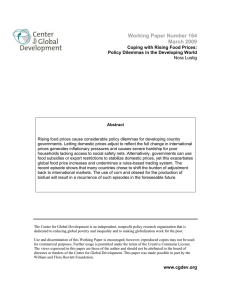Welcome to the Swiss Commodity Market Supervisory Authority ROHMA
advertisement
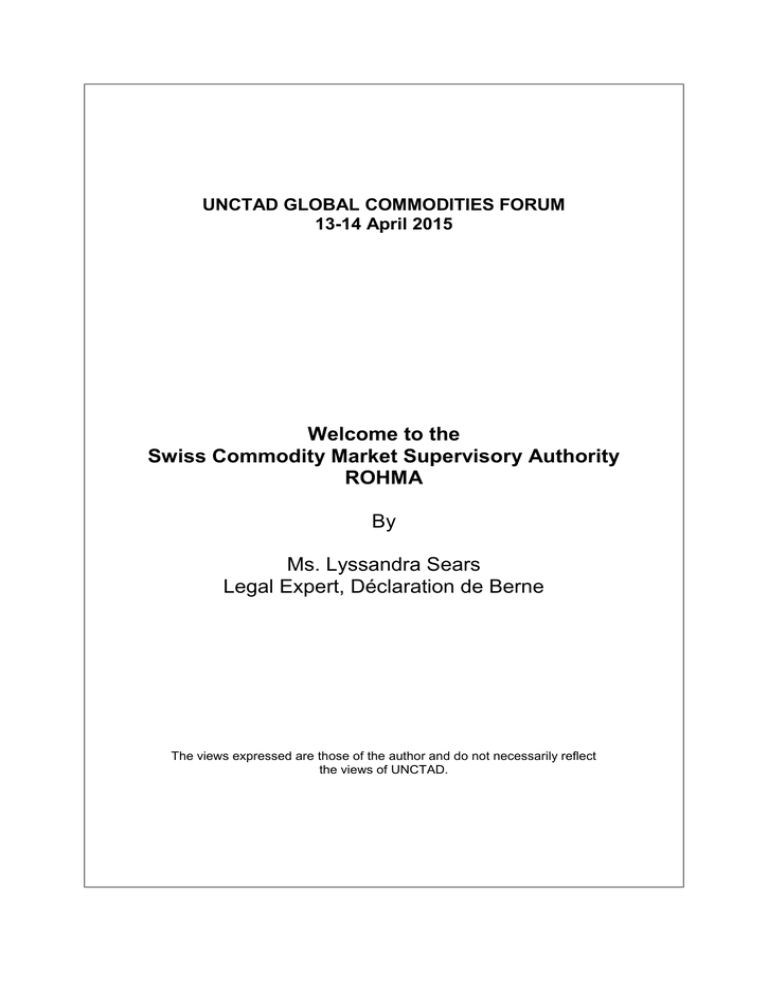
UNCTAD GLOBAL COMMODITIES FORUM 13-14 April 2015 Welcome to the Swiss Commodity Market Supervisory Authority ROHMA By Ms. Lyssandra Sears Legal Expert, Déclaration de Berne The views expressed are those of the author and do not necessarily reflect the views of UNCTAD. An idea supported by distinguished “board members” such as: Welcome to the Swiss Commodity Market Supervisory Authority ROHMA www.rohma.ch/en Bernard Bertossa Prof. Peter Eigen Former Attorney General for Geneva and Judge at the Federal Criminal Court Former Director at the World Bank, Founder Transparency International, former Chairman of the Extractive Industries Transparency Initiative (EITI) by Prof. Emmanuel Fragnière Professor at the Haute Ecole de Gestion (HEG) in Geneva and Co-director of the Commodity Trading programme (HEC-HEG) Dr. Dick F. Marty Former Swiss Councilor of States (PLR/TI) and State Councilor for the Canton Ticino. Former member of the Parliamentary Assembly of the Council of Europe (CoE) Dr. Alexandra Gillies Head of Governance, Natural Resource Governance Institute, NRGI (formerly Revenue Watch Institute) Prof. Mark Pieth Professor of Criminal Law and Criminology at the University of Basel, Chairman Basel Institute on Governance The resource curse “Africa is standing on the edge of enormous opportunity. Will we invest our natural resource revenue in people, generating jobs and opportunities for millions in present and future generations? Or will we squander this opportunity, allowing jobless growth and inequality to take root?” Kofi Annan, former secretary general at the UN and current chair of the Africa Progress Panel • Twelve of the twenty-five countries with the highest worldwide infant mortality rates are African countries rich in natural resources. • In Nigeria or Angola, for example, poverty has significantly increased in the last decade. Commodities: a unique potential • • • • • Some 69% of people in extreme poverty live in commodity-rich developing countries. Yet half of the known iron, oil and gas reserves are found in these states. If these riches could properly benefit the people of these countries, extreme poverty could be almost halved by 2030. In concrete terms, this means that some 540 million people could find their way out of poverty. This potential is unique because fossil resources can only be extracted once. Once misused, they are lost. Switzerland’s role – and responsibilities • Swiss companies control at least 20% of the world trade in commodities. • Approx. one quarter of petrol sold (2011 – 2013) by the national oil companies of the 10 principal sub-Saharan African export countries were bought by Swiss trading companies. • 500 million barrels / 55 billion $ – – 12% of public receipts Double the amount of world development aid ROHMA’s Mandate • The Swiss Commodity Market Supervisory Authority (ROHMA): – – – • is an institution under public law with its own legal personality. Its authority and powers are regulated by the Commodity Market Supervisory Authority Act (CMSAA). Is responsible for the implementation of the Commodities Act (CA). The regulation aims to: – – – – Reduce the problem of the resource curse. Mobilise resources for development and the fight against poverty in resource-rich developing countries Enable ROHMA to contribute to the reputation and image of the commodity hub and thereby maintain its competitiveness Enable ROHMA to work at an international level to ensure that other commodity hubs adopt similar rules to combat the resource curse (“a level playing field”). Problems along the commodities value chain Activities • As a state regulatory body, ROHMA is endowed with sovereign authority over commodity traders and other companies active within the commodities sector, including gold refineries. Its competences include: – – – – – – The granting of licenses, as well as supervision to ensure that the requirements for the license remain fulfilled. The enforcement of due diligence, transparency and reporting obligations and prohibitions Publication of beneficial owners, all payments to governments and all contracts and licenses made with governments The provision of mutual assistance to foreign regulators The pursuit and punishment of non-compliant behaviour The withdrawal of licenses from companies that have seriously violated the Commodities Act Prohibitions and Duties under the Commodities Act • Prohibitions: – Dealing in commodities without a license – Dealing in illegal/illegally obtained commodities – Violation of human rights/environmental norms – Violation of trade sanctions – Not paying due compensation – Aggressive tax avoidance – Name-lending – Dealing with PEPs/commodities from conflict zones/failed states/occupied territories without consent • Duties – Conduct supply chain due diligence – Know and document business partners – Appoint responsible person – Implement whistleblowing procedures – Integrate findings from audits – Cooperate and provide all information requested – Communicate on policies and findings – Proper business conduct 8 ROHMA contributions to prevent the ‘resource curse’
